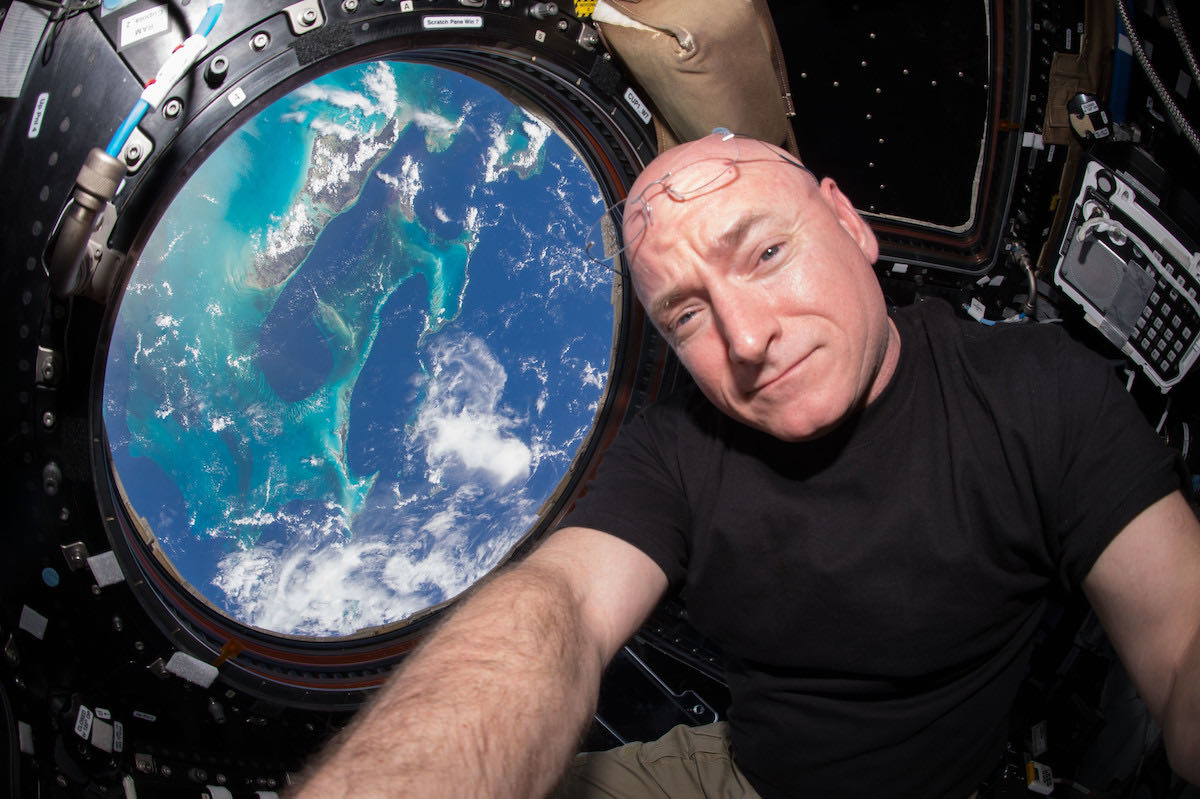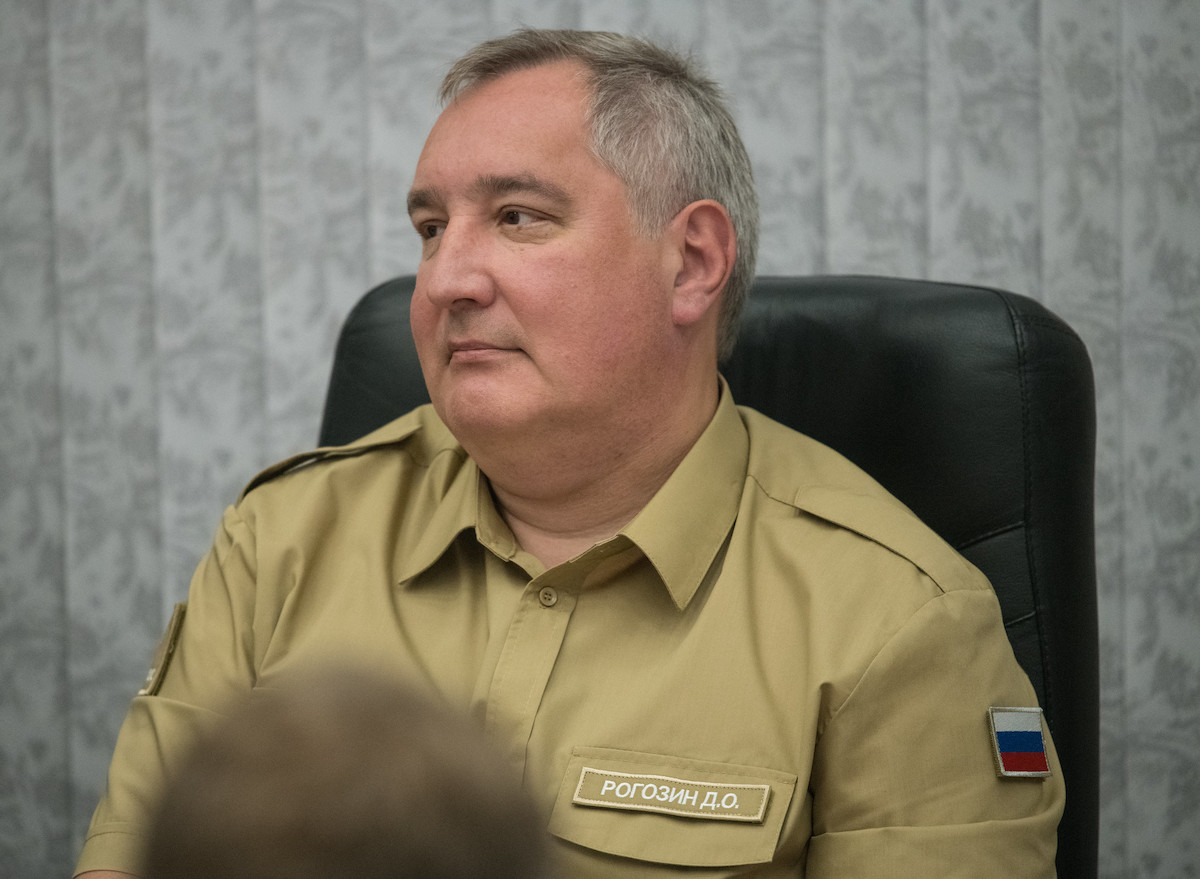Space News & Blog Articles
War of words between Russian space chief and retired astronaut
 NASA astronaut Scott Kelly aboard the International Space Station in 2015. Credit: NASA
NASA astronaut Scott Kelly aboard the International Space Station in 2015. Credit: NASA
Retired NASA astronaut Scott Kelly, who spent a U.S.-record 340 days aboard the International Space Station, has taken to Twitter to pass along “real” news to his 5 million followers, many of them in Russia, about the ongoing invasion of Ukraine.
In the process, a war of words has broken out between the astronaut and Dmitry Rogozin, director of the Russian space agency Roscosmos, who is providing a steady stream of vitriolic threats and insults aimed at NASA and its European partners in the International Space Station program.
Kelly has taken time to personally needle Rogozin, becoming one of the most visible members of the international space community to criticize Russia’s attack on Ukraine and the director of the country’s space program.
He clearly hit a nerve.
“You are being defiant and destructive,” Rogozin tweeted in remarks translated by Google. “Perhaps the dementia and aggression that you have developed is a consequence of the overload and stress of four flights into space. I invite you to undergo an examination at the Brain Institute of our Federal Medical and Biological Agency.”
Господин Скот Келли! Вы зря меня провоцируете. Мы с Вами не знакомы, но Вы обращаетесь ко мне на ты и называете "Димоном", хотя я не знаю такого обращения и не позволю Вам себя так вести со мной. Вы ведете себя вызывающе и разрушительно. https://t.co/qBb0972W7M
— РОГОЗИН (@Rogozin) March 7, 2022
In an apparently deleted tweet Monday, Rogozin said “Get off, you moron! Otherwise, the death of the #ISS will be on your conscience.”
In a phone interview with CBS News on Sunday, Kelly said Rogozin has “always been a clown” and that his recent remarks about the space station prove it. “It’s just a lot of people didn’t realize it, because they never gave him much attention. But you know, this highlights how big of a clown he really is.”
Rogozin’s comments in the wake of the Russian invasion of Ukraine have fueled speculation in the West that Russia could pull out of the International Space Station project, which currently requires Russian spacecraft, propellant and thrusters to stay in orbit.
But Kelly is confident NASA, working with commercial companies like SpaceX, could develop a way to keep the station going even in the absence of Russia.
“I think (NASA is) looking at plans, contingency plans, what they would do if we had the partnership with the Russian fall apart,” Kelly told CBS News.
“If the Russians decide that they’re going to walk away from it or do whatever, it would be hard for NASA to go it alone,” he said. “But you know, what? That’s what NASA does, they do hard things. So I think they’d figure out how we could do attitude control (or) how we could boost the space station. … It’s not impossible to go without the Russians. It’d be hard but, you know, that’s what NASA does. Hard stuff.”
Asked if it would be worth it to NASA to spend the money required to provide sole operational support of the station if it came to that, Kelly said the lab “has a good eight years left her.”
“I think it would send a good message to the Russians that if they want to get out of this partnership, then we can do it ourselves,” he added. “We don’t really need them. We did a few years ago, but not anymore, right? We can get people to the space station” aboard SpaceX Crew Dragon capsules and, eventually, Boeing’s Starliner.
Kelly said he hopes it won’t come to that because the station is important to both countries.
“Without the space station program, the Russian space agency doesn’t have much reason, at least the human spaceflight part, doesn’t really have much of a purpose to exist,” Kelly said. “All those people, some of which are friends of mine, would lose their jobs. Including, probably, Regozin would lose his job, too.”
He said he has been tweeting in Russian to friends and colleagues to put out “real information to the Russian people about what’s going on.”
“I have a lot of Russian friends. And you know, some of them are completely in line with our thinking on this, and some of them aren’t. And the ones that aren’t, it’s not because they are stupid or have bad intentions. It’s just because they’ve been fed misinformation for years and now are continuing to get propaganda and have limited access now to other sources of valid information on what’s going on.”
 Dmitry Rogozin, head oof Roscosmos. Credit: NASA/Joel Kowsky
Dmitry Rogozin, head oof Roscosmos. Credit: NASA/Joel Kowsky
With more than 5 million followers on Twitter — nearly seven times as many as Rogozin — “I just kind of figured I had a platform to get some messaging out that is the truth versus what the Russian population is being fed.”
Last week, Rogozin, acting through Roscosmos, ordered non-Russian flags on a commercially purchased Soyuz rocket to be covered up. A day or so later, the flight was canceled when OneWeb, the consortium that paid Roscosmos to launch 36 internet satellites, refused Russian demands dictating how the satellites could be used.
“Without those flags and the foreign exchange they bring in, your space program won’t be worth a damn,” Kelly tweeted in Russian. “Maybe you can find a job at McDonald’s if McDonald’s still exists in Russia.”
Rogozin replied “I am publishing this so that everyone understands the degree of American ‘gratitude’ for what Russia has done for the United States, carrying their astronauts … for 9 years to the ISS after American emergency and extremely unreliable ships (killed) two of their crews and were eventually decommissioned. We then extended a helping hand to NASA, but now the aggressive Scott has bitten her.”
He made no mention of the price NASA paid for that helping hand, some $4 billion for astronaut seats on Russian Soyuz spacecraft. But the criticism is not new. Amid U.S. threats of sanctions after Russia’s annexation of Crimea in 2014 he famously suggested NASA use trampolines to deliver astronauts to the space station.
The comments stand in stark contrast to the cooperation the two countries have maintained for the past 30 years, jointly designing, building and operating the International Space Station. Rotating crews of astronauts and cosmonauts have continuously staffed the lab complex for the past 21 years.
Both nations are required to operate the station in its current form. Russia provides the propellant and thrusters needed to keep the station in orbit while NASA provides most of the electrical power and the massive gyros needed to control its orientation without using rocket fuel. Neither side can operate the other’s systems.
NASA has kept a low profile in the wake of the Ukraine invasion, not posting any comments other than assuring reporters the crew’s safety remains the agency’s top priority.
Rogozin, on the other hand, has kept up a steady stream of angry tweets threatening the station’s survival.
“@Rogozin has always been a fool,” retired NASA astronaut Garrett Reisman, a space station veteran, said in a Russian-language tweet. “Only now he actually mortally wounds Roskosmos and ends one of the few remaining sources of currency for Russia. Keep this in mind when your ATM is empty. It will need a trampoline soon.”
When you subscribe to the SpaceZE News Feed, we will send you an e-mail when there are new updates on the site so you wouldn't miss them.

